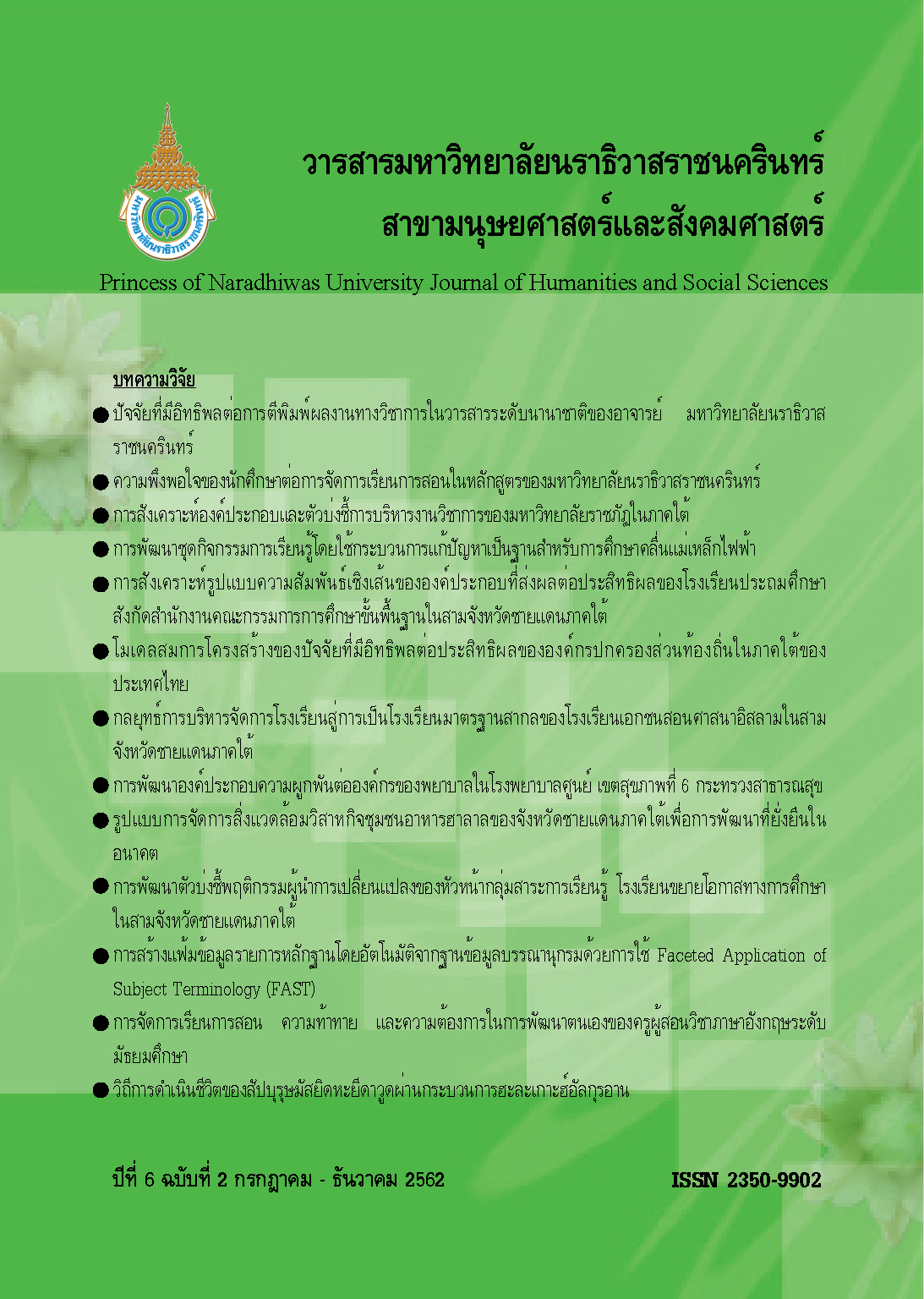In-Service Secondary School English Language Teachers' Instructional Practices, Challenges, and their Training Needs: A Focus Group Interview Study
Main Article Content
Abstract
This article aims to report the findings of a descriptive qualitative study on in-service teachers’ beliefs toward their teaching practices, teachers’ beliefs concerning integrating local and global issues into English lessons, the challenges that they faced throughout their professional growth, thus for far, and their needs of the training program, as reported by eight Thai female high school teachers of English in Narathiwat province. All of them volunteered to participate in the present study. Six of these English language teachers are from an urban high school, and two of them are from a high school in Tak Bai District. They all participated in the data collection. All of them had experiences for participating in the professional training program. The data were collected by means of focus group interviews and analyzed in order to identify teachers’ educational backgrounds, teachers’ teaching practices, challenging issues, and their needs of a training program.
The findings clarified that Thai English language teachers faced many problems concerning their teaching practices and their workloads. However, all of them deal with those problems based on their knowledge and teaching experiences. Additionally, they needed to attend the training courses, in which various active activities were done such as doing workshops, and sharing ideas rather than lecturing. They agreed that the teacher professional development (TPD) training program increased their professional knowledge and practices and improved their teaching quality. They also mentioned that attending such a training program can improve not only their instructional knowledge and practices, but also their students’ learning outcomes. Moreover, all teachers of English thought positively about integrating local and global issues into English classrooms. They proposed that integrating local topics can develop students’ English proficiencies, cultural understanding, students’ attitudes of cultural differences, and cultural awareness.
Article Details
References
AL-Qahtani, H. M. (2015). Teacher’s Voice: A Needs Analysis of Teachers’ Needs for Professional Development with the Emergence of the Current English Textbooks. English Language Teaching, 8(8), 128-141.
Atagi, R. (2011). Secondary Teacher Policy Research in Asia: Secondary Teachers in Thailand.
Bangkok: UNESCO.
Burns, R. B. (2000). Introduction to Research Methods (4thed.). London: SAGE.
Creswell, J. W. (2012). Qualitative Inquiry & Research Design: Choosing Among Five Approaches (3rded.). California: SAGE.
Cohen, L., Manion, L. & Morrison, K. (2011). Research Methods in Education (7thed.). Oxfordshire: Routledge.
Corbin, J., & Strauss, A. (1990). Grounded Theory Research: Procedures, Canons, and Evaluative Criteria. Qualitative Sociology, 13(1), 3-21.
Eaton, S. E. (2010). Global Trends in Language Learning in the Twenty-First Century.
Calgary: Onate Press.
González, A., Montoya, C. & Sierra, N. (2002). What do EFL Teachers Seek in Professional Development Program? Voices from Teacher. Ikala, revista de lenguaje y cultura, 7(13), 29-46.
Guskey, T. R. (2000). Evaluating Professional Development. California: Corwin Press.
Glatthorn, A. (1995). Teacher Development. In Anderson, L. (ed.). International Encyclopedia of Teaching and Teacher Education (2nded.). London: Pergamon Press.
Harmer, J. (2007). The Practice of English Language Teaching. United Kingdom: Longman.
Kotharaarsa, W. (2004). Professional Teacher: A Learning System Designer. Journal of Education, 4(4), 31-36.
Kusumoto, Y. (2008). Needs Analysis: Developing a Teacher Training Program for Elementary School Homeroom Teachers in Japan. Second Language Studies, 26(2), 1-44.
Moswela, B. (2006). Teacher professional development for the new school improvement:
Botswana. Journal of Lifelong Education, 25(6), 623-632.
Murray, A. (2010). Empowering Teachers through Professional Development. English Teaching Forum, 1, 2-11.
Matsuda, A., & Friedrich, P. (2010). Selecting an Instructional Variety for an EIL Curriculum. In Matsuda, A. (ed.). Principles and Practices of Teaching English as an International Language (pp. 17-27). United Kingdom: Short Run Press.
Office of Education Council. (2009). Proposal for the 2nd Decade Education Reform (2009–2018). Bangkok: Office of the Prime Minister.
Office of the Education Council. (2017). Education in Thailand. Bangkok: OEC.
Richardson, P. (2012). Teaching with a Global Perspective. The Journal of the Virginia Community Colleges, 17(1), 43-50.
Simsek, M. R. (2017). Confronting Culture in Local and Global English Coursebooks: Student Teachers’ Preferences in Materials Adaptation. Journal of Theory and Practice in Education, 13(2), 277-300.
Sitthitikul, P. (2010). Curriculum Context Analysis to Support Meaningful EFL Reading in
Thailand. Journal of English Studies, 5, 57-71.
Sheffield, R., Blackley, S., & Moro, P. (2018). A Professional Learning Model Supporting Teachers to Integrate Digital Technologies. Issues in Educational Research, 28(2), 487-510.
The Secretariat of the Cabinet. (2005). Government Gazette Vol. 122 Special Part 76D. Bangkok: Cabinet and Royal Gazette.
Timperley, H., Wilson, A., Barrar, H., & Fung, I. (2007). Teacher Professional Learning and Development: Best Evidence Synthesis Literation. New Zealand: Ministry of Education.
Wisetsuwannabhum, K., Inrak, C. & Tangpanitanwat, A. (2013). The Research and Development on Learning Network Innovation of Teachers and Educational Staff to Develop Students’ Quality in the Three Southern Border Provinces. Parichart Journal, 25(2): 81-90.
Zivkovic, P. (2013). Professional Development and Teachers Professional Identity: Self- Assessment
in Republic of Serbia. Journal of Educational and Instructional Studies in the World. 3(1), 150-158.

